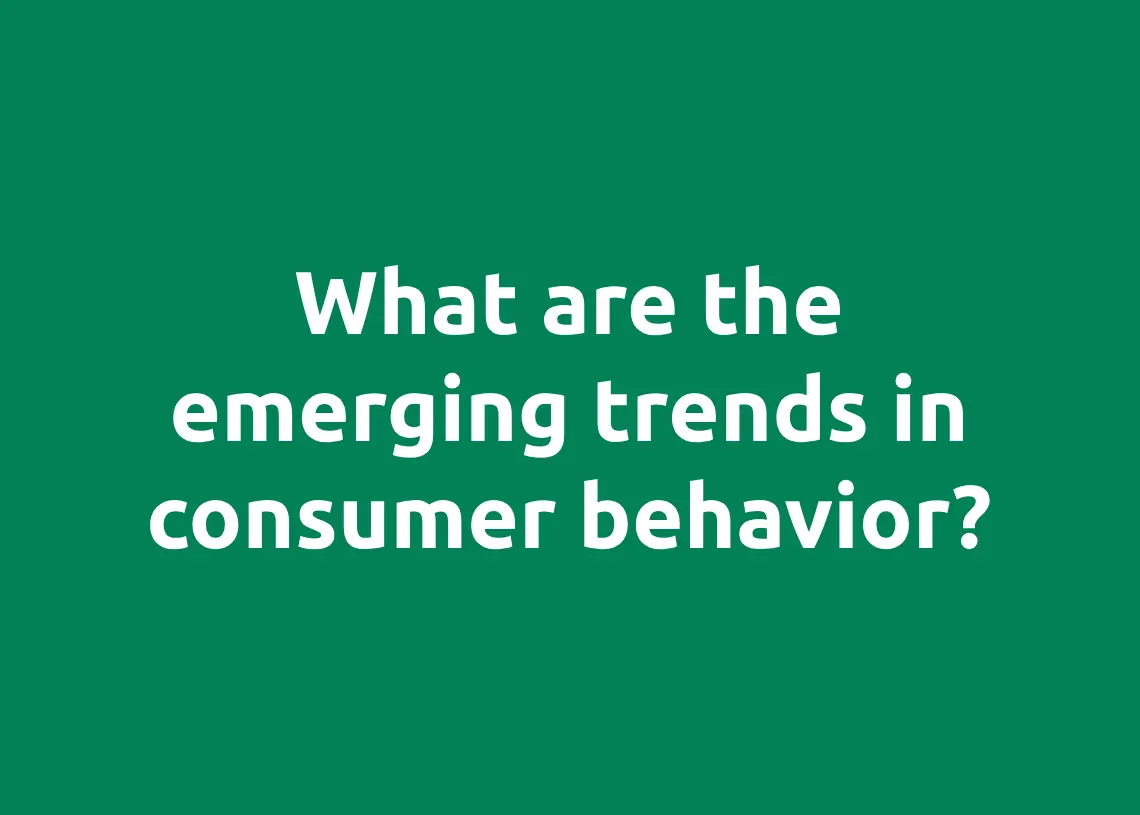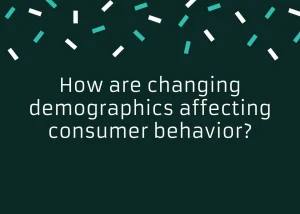Consumer behavior is at the core of any business’s success, and it is critical for organizations to stay up to date with the latest trends and shifts in consumer behavior to remain competitive. As we move further into the digital age, consumer behavior is evolving at an unprecedented rate, and businesses must adapt accordingly. This has led to a growing need for businesses to stay informed about emerging trends in consumer behavior.
Understanding emerging trends in consumer behavior is crucial for businesses of all sizes to stay relevant and competitive. With new technologies emerging seemingly every day, consumer behavior is changing in ways that were unimaginable just a few years ago. From social media and mobile devices to artificial intelligence and virtual reality, emerging technologies are shaping how consumers interact with brands and make purchasing decisions.
In this blog post, we will explore some of the emerging trends in consumer behavior that businesses must be aware of to stay ahead of the curve. We will discuss the impact of these trends on businesses, how they can be leveraged to improve customer experiences, and much more.
Increased use of mobile devices
One of the most significant emerging trends in consumer behavior is the increased use of mobile devices. With the prevalence of smartphones and tablets, consumers are now using these devices to access information, shop, and communicate with others more than ever before. According to recent studies, mobile devices account for more than half of all internet traffic, and this trend is expected to continue in the years to come.
Consumers are now using their mobile devices not only for basic tasks such as making calls and sending texts but also for more complex activities such as online shopping, banking, and social media interactions. As a result, businesses must adapt to this trend and ensure that their websites and online platforms are optimized for mobile devices to meet the evolving needs of consumers.
Greater demand for personalization
One of the emerging trends in consumer behavior is the greater demand for personalization. Consumers today are more likely to seek personalized products and services that cater to their unique needs and preferences.
This demand for personalization is driven by the increasing availability of technology and data, allowing companies to collect and analyze consumer information to create tailored offerings. Consumers value personalized experiences as they feel more engaged and connected to the brand, leading to increased loyalty and satisfaction. As a result, companies are investing in technologies such as artificial intelligence and machine learning to create personalized marketing campaigns and product recommendations.
Therefore, it is important for businesses to understand the importance of personalization and how it can drive consumer behavior and ultimately impact their bottom line.
Growing importance of sustainability
Sustainability has emerged as a significant trend in consumer behavior, with consumers increasingly prioritizing eco-friendly and socially responsible products. The growing awareness of the impact of human activity on the environment has led to a shift in consumer preferences towards sustainable products.
Consumers are now more conscious of the environmental and social impact of their consumption choices and are seeking products that align with their values. This trend is driven by the belief that consumers have a responsibility to protect the planet and future generations.
Sustainable products, such as those made from recycled materials, organic products, and products with eco-friendly packaging, have become more popular as consumers strive to reduce their carbon footprint. The importance of sustainability is expected to continue to grow as more consumers become aware of the environmental impact of their consumption choices.
Companies that prioritize sustainability in their products and practices are likely to attract more consumers and gain a competitive advantage.
Rise of conscious consumerism
In recent years, there has been a notable shift in consumer behavior towards conscious consumerism. Conscious consumerism refers to a growing trend among consumers to make purchasing decisions that reflect their values, including social and environmental responsibility.
This trend is driven by a range of factors, including increased awareness of social and environmental issues, as well as a desire to make a positive impact on the world. As a result, consumers are increasingly seeking out products and services that align with their values and are willing to pay a premium for such products.
Companies that fail to recognize this trend risk losing market share to competitors who are able to effectively meet the demands of conscious consumers. Therefore, it is important for businesses to understand this emerging trend and adapt their strategies accordingly in order to remain competitive in the marketplace.
Expansion of e-commerce platforms
One of the emerging trends in consumer behavior is the expansion of e-commerce platforms. With the increasing dominance of digital technologies in our lives, consumers are increasingly turning to e-commerce platforms to fulfill their shopping needs.
These platforms offer a wide range of products at competitive prices, coupled with the convenience of shopping from the comfort of one’s own home. The trend towards e-commerce is further fueled by the COVID-19 pandemic, which has forced consumers to rely more heavily on online shopping due to social distancing measures and lockdowns.
As a result, businesses are increasingly focusing on developing their online presence and expanding their e-commerce capabilities to cater to the changing preferences of consumers. This trend is expected to continue in the coming years, as consumers become more comfortable with shopping online and businesses continue to invest in e-commerce platforms to meet the growing demand.
Trend towards experiential shopping
One of the emerging trends in consumer behavior is the shift towards experiential shopping. Consumers are no longer content with simply purchasing goods; they are seeking unique, memorable experiences that enhance the overall shopping experience.
This trend has been driven by a number of factors, including the rise of social media and increasing competition from online retailers. In response, brick-and-mortar stores are investing in creating immersive and interactive shopping experiences that engage and delight customers. Examples include in-store events, product demonstrations, interactive displays, and even virtual and augmented reality experiences.
The experiential approach offers retailers the opportunity to create a deeper connection with their customers and differentiate themselves from their competitors. As such, this trend is expected to continue to gain momentum in the coming years.
Emphasis on brand values and ethics
One of the emerging trends in consumer behavior is the increasing emphasis on brand values and ethics. Consumers are becoming more conscious of the impact their purchasing decisions have on the world around them and are demanding that the brands they support align with their own values.
This trend has been driven in part by the rise of social media, which has given consumers a platform to voice their opinions and hold brands accountable for their actions. Consumers are looking for brands that are transparent about their supply chains, committed to sustainability, and ethical in their business practices.
This trend has implications for businesses, as they need to be aware of the values and priorities of their target audience and make sure they align with them. Failure to do so can lead to a loss of trust and reputation damage. Overall, this trend highlights the growing importance of social responsibility in business and the need for brands to prioritize ethical considerations in their operations.
Adoption of augmented reality technology
One of the emerging trends in consumer behavior is the adoption of augmented reality (AR) technology. AR technology allows consumers to experience products and services in a more interactive and engaging way, bridging the gap between virtual and physical reality.
Consumers can use AR to try on clothes, preview furniture in their own homes, or even explore virtual stores. This technology has the potential to revolutionize the way consumers shop and make purchasing decisions, as it provides a more immersive and personalized experience.
As AR technology becomes more widely available, it is expected to see an increase in adoption among consumers and businesses alike. This trend highlights the importance of incorporating new technologies into marketing strategies to better engage with consumers and stay competitive in the market.
Conclusion: What are the emerging trends in consumer behavior?
In conclusion, consumer behavior is constantly evolving, and it is vital for businesses to keep up with emerging trends to stay relevant. In today’s world, consumers are more interested in personalized experiences, ethical and sustainable products, and convenience.
The rise of technology has also impacted consumer behavior, with increasing use of mobile devices for shopping and the growing importance of social media in influencing purchase decisions. As businesses adapt to these emerging trends, they can gain a competitive advantage and build strong customer relationships. Therefore, staying up-to-date with the latest trends in consumer behavior is crucial for businesses to succeed in today’s rapidly changing market.




